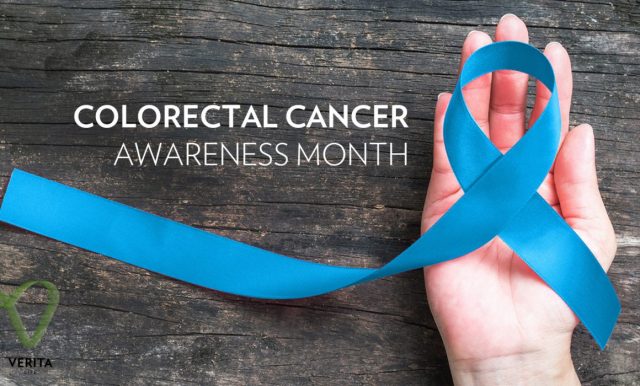 It’s Colorectal Cancer Awareness Month. According to the American Cancer Society, it’s the third most common cancer in the United States. 1 in 22 men and 1 in 24 women will develop the cancer at some point in their life. It’s estimated that about 51,020 people will die from it this year.
It’s Colorectal Cancer Awareness Month. According to the American Cancer Society, it’s the third most common cancer in the United States. 1 in 22 men and 1 in 24 women will develop the cancer at some point in their life. It’s estimated that about 51,020 people will die from it this year.
Although some of the risk factors for the disease are out of your control, such as family history, previous bowel diseases, or genetic syndromes, there are actually many things in your control that will help to reduce your risk. Consuming a diet high in whole grains, fruits, and vegetables and low in red meats and processed foods is one way to give yourself an advantage. Along with regular exercise, maintaining a balanced diet can help you to avoid both obesity and type 2 diabetes, two risk factors for colon cancer. Reducing alcohol consumption and smoking are other ways you can lower your risk.
But perhaps the most important thing of all is getting screened for colon cancer. Getting a colonoscopy starting at age 45 is best way to detect the cancer early, and it could certainly save your life.
What are the current screening recommendations?
The American Cancer Society suggests that people with an average risk of colorectal cancer begin regular screening at age 45. What does average risk mean?
- You don’t have a personal history of colorectal cancer or certain types of polyps
- You don’t have a family history of colorectal cancer
- You don’t have a personal history of inflammatory bowel disease (ulcerative colitis or Crohn’s disease)
- You don’t have a confirmed or suspected hereditary colorectal cancer syndrome, such as familial adenomatous polyposis (FAP) or Lynch syndrome
- You don’t have a personal history of getting radiation to the abdomen (belly) or pelvic area to treat a prior cancer
Healthy individuals at an average risk of developing colon cancer should continue colorectal cancer screening until they reach the age of 75.
Those at high risk of developing the disease need to speak to their doctors to determine exactly when they should begin screening. Depending on which risk factor(s) cause them to be at a higher risk, the recommendations usually involve getting colonoscopies at an earlier age.
What are the screening options?
The most common screening option for colorectal cancer is a colonoscopy, which is a visual and structural exam of the colon and the rectum. A standard colonoscopy is given every 10 years, a CT colonography (virtual colonoscopy) is given every 5 years, or a flexible sigmoidoscopy (FSIG) is given every 5 years.

There are also stool-based tests that can be given yearly, but you’ll want to check with your doctor to see if these are right for you. Sometimes, they can act as a first-line screening to determine whether further testing is necessary.
Is getting the screening really life or death?
 It can be. The important thing about the screenings is that they detect cancerous polyps when they are in their early stages, likely before they’ve spread elsewhere in the body. Screening allows doctors to discover and remove polyps, whether they’re malignant or benign. It also gives them more information about your particular risk factors and can guide them to suggest further screening protocols. Forgoing screenings could mean you don’t discover the cancer until you have symptoms, which oftentimes is too late.
It can be. The important thing about the screenings is that they detect cancerous polyps when they are in their early stages, likely before they’ve spread elsewhere in the body. Screening allows doctors to discover and remove polyps, whether they’re malignant or benign. It also gives them more information about your particular risk factors and can guide them to suggest further screening protocols. Forgoing screenings could mean you don’t discover the cancer until you have symptoms, which oftentimes is too late.




























